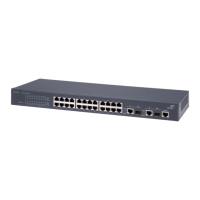1-2
Flush message
When a forwarding link fails, the device will switch the traffic to the blocked standby link. The former
forwarding entries of each device in the network are no longer suitable for the new topology, so MAC
address forwarding entries and ARP entries must be updated throughout the network. In this case, the
Smart Link group sends flush messages to notify other devices to refresh MAC address forwarding
entries and ARP entries.
Control VLAN for sending flush messages
This control VLAN sends flush messages. When link switching occurs, the device (Switch A in Figure
1-1) broadcasts flush messages in this control VLAN.
Control VLAN for receiving flush messages
This control VLAN is used for receiving and processing flush messages. When link switching occurs,
the devices (Switch B and Switch C in
Figure 1-1) receive and process flush messages of this control
VLAN, and then refresh MAC forwarding table entries and ARP entries.
z Currently, the member ports of a Smart Link group cannot be dynamic link aggregation groups.
z If the master port or slave port of a Smart Link group is a link aggregation group, you cannot
remove this link aggregation group directly or change the aggregation group into a dynamic
aggregation group. Before removing this aggregation group, you must unbind the link aggregation
group from the Smart Link.
Operating Mechanism of Smart Link
Figure 1-2 Network diagram of Smart Link operating mechanism
BLOCK
Switch A Switch B
Eth1/0/1
Eth1/0/2
Switch C Switch D
Switch E
Eth1/0/1
Eth1/0/2
Eth1/0/3
Eth1/0/1
Eth1/0/2
Eth1/0/11
Eth1/0/12
As shown in
Figure 1-2, Ethernet1/0/1 on Switch A is active and Ethernet1/0/2 on Switch A is blocked.
When the link connected to Ethernet1/0/1 fails, Ethernet1/0/1 is blocked automatically, and the state of
Ethernet1/0/2 turns to active state.

